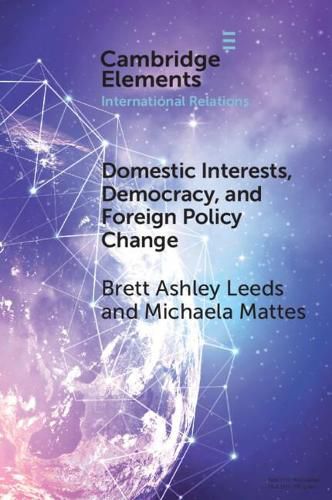Readings Newsletter
Become a Readings Member to make your shopping experience even easier.
Sign in or sign up for free!
You’re not far away from qualifying for FREE standard shipping within Australia
You’ve qualified for FREE standard shipping within Australia
The cart is loading…






When new leaders come to office, there is often speculation about whether they will take their countries’ foreign policies in different directions or stick to their predecessors’ policies. We argue that when new leaders come to power who represent different societal interests and preferences than their predecessors, leaders may pursue new foreign policies. At the same time, in democracies, leadership selection processes and policymaking rules blunt leaders’ incentives and opportunities for change. Democracies thus tend to pursue more consistent foreign policies than nondemocracies even when new leaders with different supporting coalitions assume office. Statistical analyses of three distinct foreign policy areas - military alliances, UNGA voting, and economic sanctions - provide support for our argument. In a fourth area - trade - we find that both democracies and nondemocracies are more likely to experience foreign policy change when a new leader with a different supporting coalition comes to power. We thus conclude that foreign policy responds to domestic political interests, and that, even as the interests supporting leaders change, democracies’ foreign policies are no less stable than those of nondemocracies and often exhibit greater consistency.
$9.00 standard shipping within Australia
FREE standard shipping within Australia for orders over $100.00
Express & International shipping calculated at checkout
When new leaders come to office, there is often speculation about whether they will take their countries’ foreign policies in different directions or stick to their predecessors’ policies. We argue that when new leaders come to power who represent different societal interests and preferences than their predecessors, leaders may pursue new foreign policies. At the same time, in democracies, leadership selection processes and policymaking rules blunt leaders’ incentives and opportunities for change. Democracies thus tend to pursue more consistent foreign policies than nondemocracies even when new leaders with different supporting coalitions assume office. Statistical analyses of three distinct foreign policy areas - military alliances, UNGA voting, and economic sanctions - provide support for our argument. In a fourth area - trade - we find that both democracies and nondemocracies are more likely to experience foreign policy change when a new leader with a different supporting coalition comes to power. We thus conclude that foreign policy responds to domestic political interests, and that, even as the interests supporting leaders change, democracies’ foreign policies are no less stable than those of nondemocracies and often exhibit greater consistency.